Editor's Note: This article is part of an ongoing WPR series about education policy in various countries around the world.
Chile's president, Michelle Bachelet, has made education reform a central component of her strategy to combat inequality. But her approach has been a frequent source of controversy, and with a presidential election later this year, it is likely to become a central issue in the campaign. In an email interview, Kirsten Sehnbruch, director of the Institute of Public Policy at the Universidad Diego Portales, research associate of the Center for Social Conflict and Cohesion and affiliated lecturer at the University of Cambridge, describes what Bachelet's reforms have accomplished already and how they might figure in political debates leading up to the next presidential vote.
WPR: What is the state of Chile's education system, and what issues have been driving the debate over reforming it in recent years?

